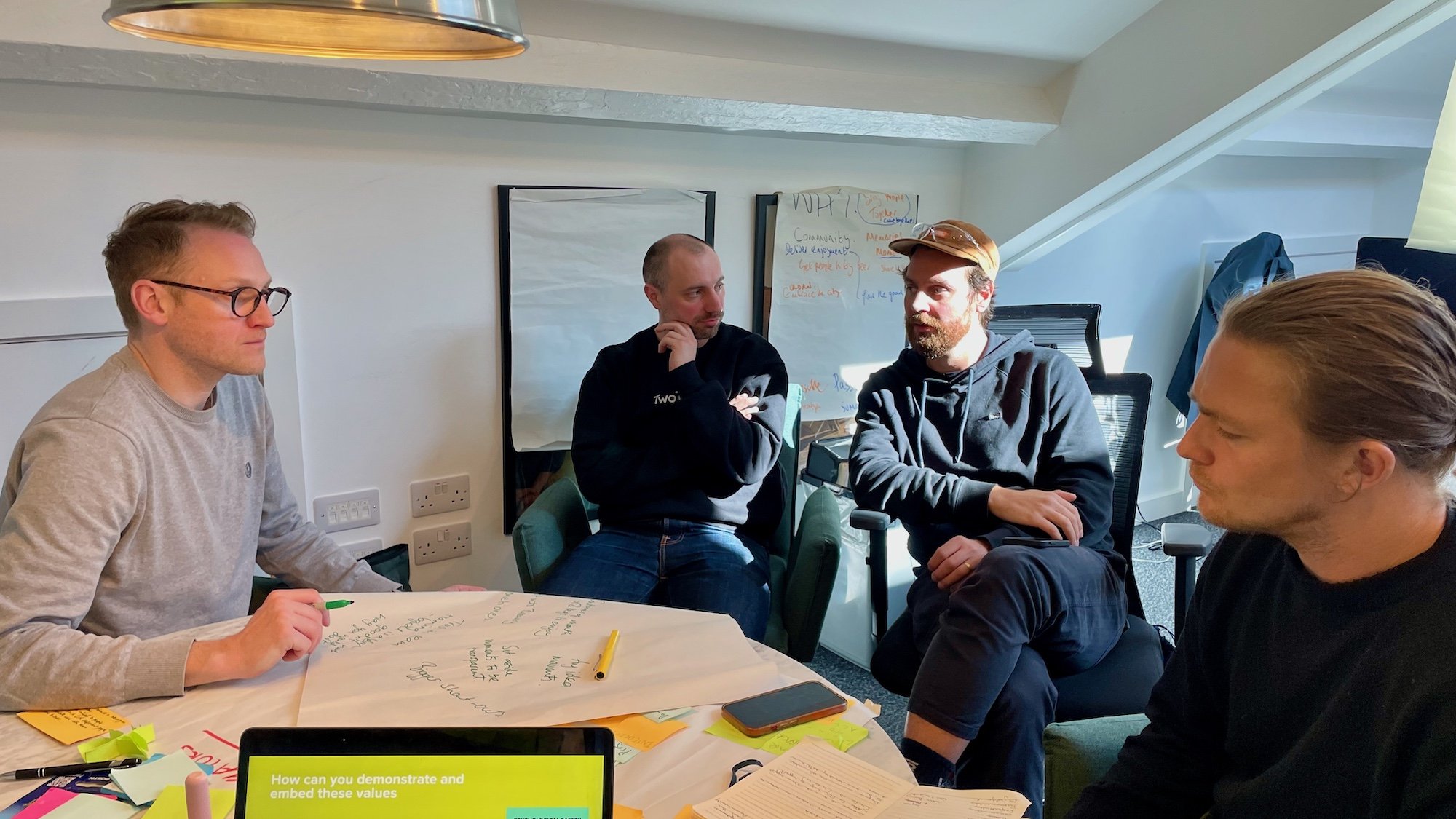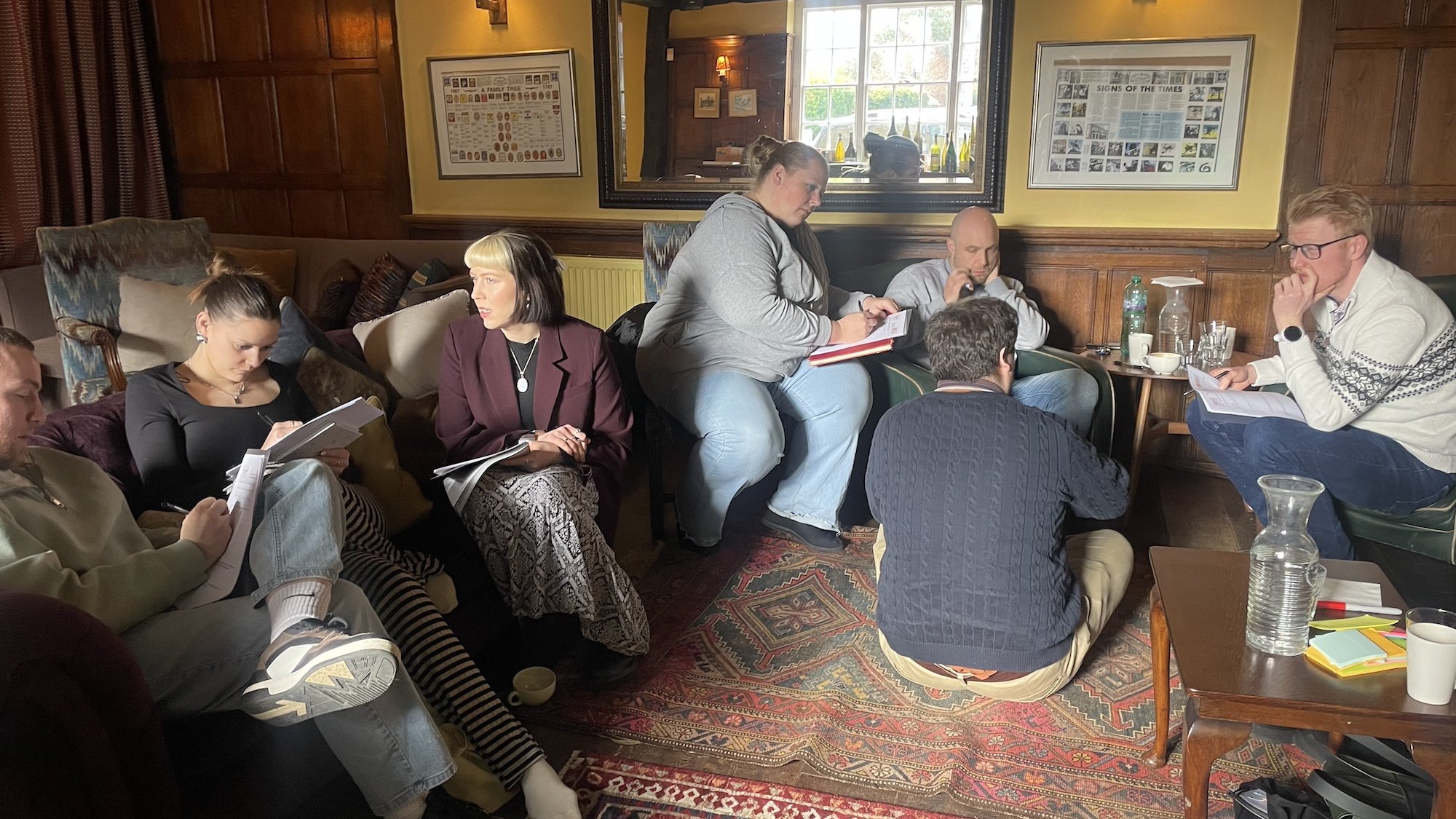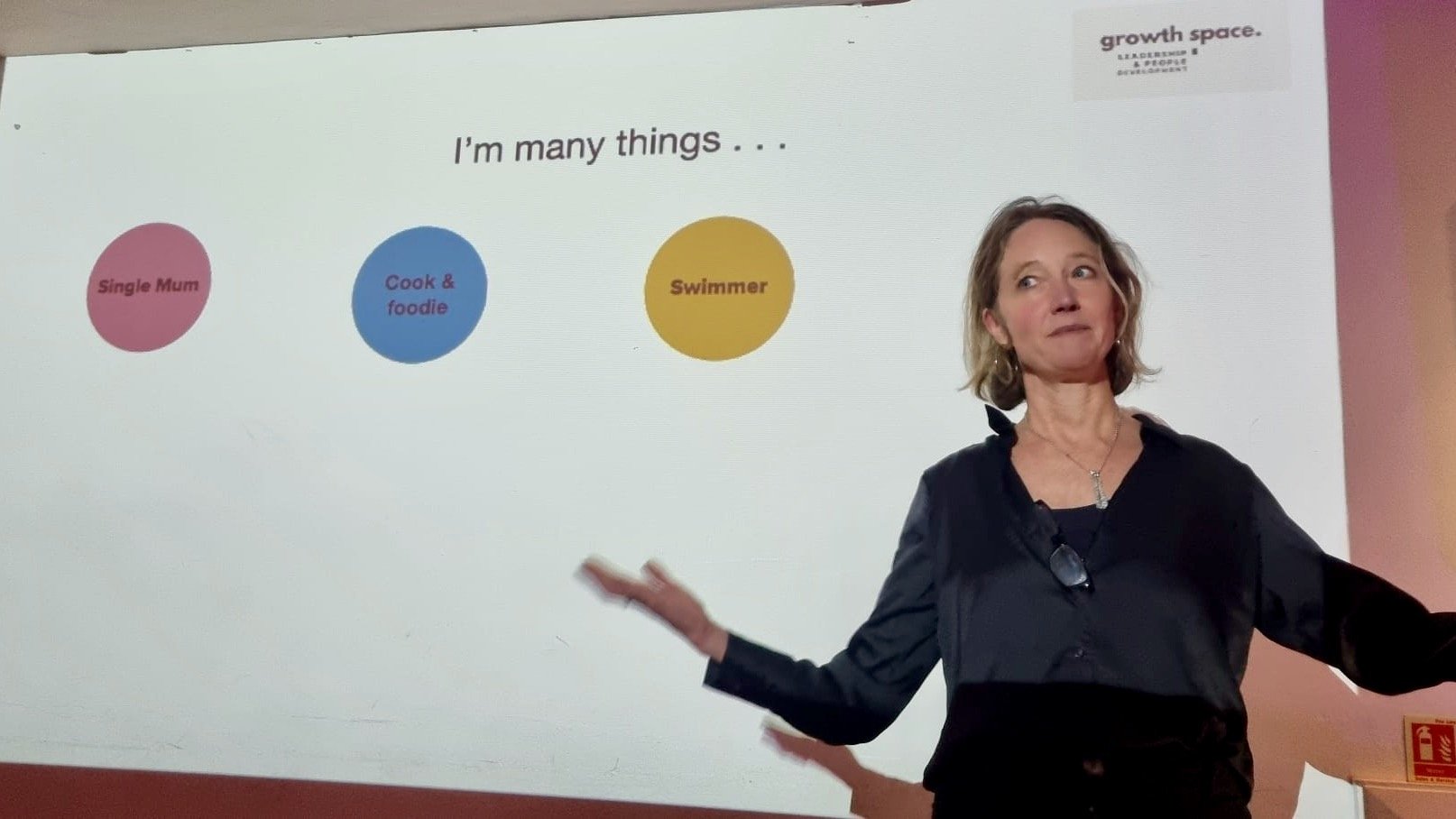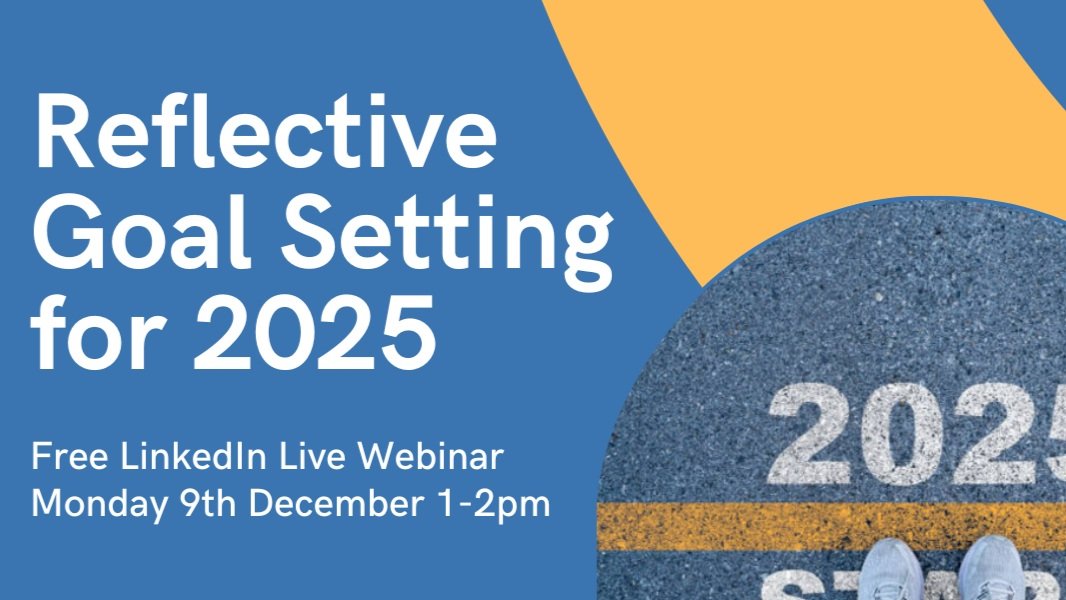
BLOG
Inspiration and news
How to Run a Successful Strategy Day for Your Leadership Team
Discover how to plan and run a successful Strategy Workshop, Away Day or Off-site.
Start with these 10 questions to ask before planning Stategy day and find tips on structure, tools and faciliation.
Are your strategy and business plan still relevant and fit for the future?
When was the last time you stepped back to look at it with a fresh perspective and reflect on your current reality or changing external environment?
Is your leadership team bogged down in the day-to-day pressures of running a business?
In today’s volatile, uncertain, complex and ambiguous (VUCA) world, strategy can’t be static. It must evolve, flex, and respond to change. And unless you press pause, you risk:
Losing sight of your purpose and goals
Losing sight of your customers or clients
Making decisions based on habit
Missing new opportunities or threats
Staying stuck in outdated ways of thinking
A strategy workshop (or leadership away day) is a dedicated time and space for leadership teams to focus on long-term planning and strategic direction, free from daily operational pressures. It's a chance to step back from the day-to-day and consider the big picture, ensuring alignment and a shared vision for the future.
Tips, questions and facilitation ideas to design and run a successful Strategy Day
Why You Need to Make Space for a Strategy Workshop
Strategic Alignment - Ensure everyone agrees on the organisation's goals, priorities, and how to achieve them.
Improved Communication - Create a safe environment for open dialogue and healthy debate about the future and challenge the status quo.
Enhanced Creativity - Step outside daily operations to generate fresh ideas, identify new opportunities, and innovative solutions.
Reduced Risk - Spot obstacles, blind spots and external changes (economic, social, technological) and develop plans to respond.
Increased Efficiency - When everyone understands the strategic direction, decisions are quicker and more aligned, saving time, effort and resources.
Better Decision-Making - Clarify what matters most and make decisions that drive the business forward.
Motivation and Engagement - Re-energise your leadership team around shared direction, purpose and priorities.
Tips for Facilitating a Productive Strategy Day
Be clear on outcomes - What do you want to get out of the workshop? Be specific: Do we want decisions? Prioritisation? Alignment? A plan? Clarity on ownership?
Keep it focused - Don’t be tempted to cram too much in with a long agenda. Choose three or four themes or strategic questions and leave time for in-depth conversations and creative thinking.
Change the space - A strategy day should feel different from a regular meeting, so moving away from the office helps to remove distractions and creates a fresh perspective. Look for a venue that feels fresh, creative and different (not just another boardroom) to inspire fresh, innovative thinking.
Ditch the table - Boardroom tables can reinforce traditional hierarchy and power structures. To create more openness, equality and more dynamic conversation, sit in a circle or a horseshoe.
Warm up - Begin with something reflective or fun. Ask people to share what they’d like to get out of the day, what they’re proud of, or what they’re finding challenging. If you want something different, there are dozens of resources online on ice-breakers, but choose something that feels right for your people and your culture.
Create space for private thinking, as well as group discussion - Use the 1–2–3 model: Start with solo reflection, move into pairs or trios, then share insights and discuss with the full group. This ensures deeper thinking and broader participation. This supports introverted people who like to think before speaking and may get dominated by the extroverts.
Keep the energy up - Vary activities and use movement, change locations, or shift between sitting and standing.
End with action: Conclude with specific next steps, ownership, and a timeline. Don’t leave without decisions.
Facilitating it yourself? Stay neutral where possible, ask more than you tell, and be clear about roles: who’s leading the discussion, capturing notes, and managing time.
Bring in an external Facilitator - they bring clarity, neutrality, fresh challenge and the skill to manage energy, group dynamics and tough conversations.
How do you structure the day?
The structure of the day should be based around your goals, culture and priorities. Here are some tools you can use:
Strategic frameworks (SWOT, PESTLE, Ansoff Matrix)
Business Model Canvas and capability mapping
Decision-making tools (prioritisation grids like the Eisenhower Matrix, stakeholder maps)
Creative exercises to unlock fresh thinking
Time for individual reflection and thinking as well as group work.
Key themes to include:
Where are we now, what’s working and what’s not?
Where do we want to go from here and why?
What’s changing in the wider world?
What behaviours or structures are holding us back?
How do we stay aligned through growth, change, or challenge?
What capabilities will we need for the future?
SMART goals, KPIs or OKRs - What action will we take, when and who owns what?
10 Questions to Ask Before Planning a Strategy Day
Here are 10 quick questions to ask before planning a Strategy Workshop:
Do we need to step away from the day-to-day and look at the big picture?
Has our strategy, purpose or vision drifted or lost clarity?
Do we need to review our priorities or build shared accountability around them?
Are we aligned as a leadership team on where we're going and how to get there?
Are we facing a period of change, growth, or external uncertainty?
Are we stuck in old ways of thinking or doing things simply because 'that’s how we’ve always done it'?
Have we welcomed new leaders, directors or team members who need to get on the same page?
Are there behaviours, habits or silos that are getting in the way of collaboration or performance?
Do we have key decisions or trade-offs to make that require input and commitment from everyone?
Would an external Facilitator help to create an open forum for us to think differently and move forward faster?
If you're answering yes to several of these, it may be time to make time to focus on your strategy.
Would you like help to plan and facilitate your next Strategy Workshop or Leadership Away Day?
Polly Robinson, Growth Space
At Growth Space, our approach is to create engaging, energising and purposeful Offsites and Away Days. We bring
Strategic tools, frameworks, structures and practical tools.
Challenge and fresh perspective to encourage new ways of thinking
The right balance of purpose and results with energy and fun
Warmth and the ability to build rapport and create psychological safety, so everyone has a voice.
If you want help with your next strategy session, let’s talk.
Call: 07966 475195
Email: polly@pollyrobinson.co.uk
Book at time to meet via Zoom or Teams via Calendly >
Planning an Offsite or Away Day? Start With These 10 Questions
Planning a leadership offsite or team strategy day? These 10 essential questions will help you design a session that delivers clarity, connection and real results — not just good intentions.
If you’re planning a leadership off-site, strategy workshop or team away day, pause before you start booking venues or building slides.
Off-sites, Workshops, and Team Away Days can build trust, clarity, and momentum, or leave your team asking, “What was the point of that?”
Before sending the calendar invitation, ask these ten questions to help you design an off-site that delivers meaningful results and avoid the “nice lunch, no outcomes” trap.
10 Questions to Answer before holding an Off-site, Workshop or Away Day
1. What are we trying to achieve?
Every offsite should have a clear why. Without it, the day risks feeling vague or performative. Being clear on the purpose shapes everything: format, facilitation, outcomes, and energy. Without this clarity, the day risks feeling vague or performative. Ask:
What’s the problem or challenge we’re trying to solve?
Is it to solve a problem (misalignment, disconnection, lack of clarity) Is it to respond to a shift (new CEO, strategy change, growth) or is it to unlock new ideas and momentum?
Why now?
Try this: Write your purpose in a single sentence — and use it to brief your team, venue or facilitator.
2. What outcomes do we want?
Get specific. Whether your off-site, away day or workshop is about setting strategic priorities, exploring culture and values, building trust, communication or collaboration. Outcomes don’t need to be rigid but they should be meaningful, specific, and linked to business needs. Ask:
What decisions do we want made?
What conversations need to happen?
How will we know if the day has been successful?
0
3. Who should be in the room and why?
The impact of your session depends on who’s involved. Off-sites are more impactful when the right people are present and when you’re clear on what each person brings. Consider:
Are we including decision-makers and people with insight and lived experience?
Are we bringing the right mix of perspectives, roles and personalities?
Do we need external stakeholders, new hires or future leaders in the room?
Is there anyone whose absence will limit our ability to move forward?
4. What do we want people to think, feel and do afterwards?
A successful offsite should shift something mindset, motivation, behaviour, or direction. Avoid vague goals like “alignment” or “team bonding.” Ask:
What impact do we want this to have?
What new behaviours do we want to see?
What conversations are overdue?
What actions should people commit to?
5. What’s likely to get in the way and how will we handle it?
Tension, cynicism, unspoken issues, unresolved conflict, cynicism or fatigue. Every offsite has potential blockers. Ignoring them doesn’t make them disappear, but designing with them in mind makes the day more honest, useful and inclusive. This is where a skilled external facilitator can help to surface the tough stuff and move forward constructively.
Ask:
What’s not being said?
What might stop people being honest?
How can we create a safe, inclusive space?
6. Is everyone clear on why they’re invited and what’s expected?
Offsites work when people show up ready to participate, not just spectate. When people feel prepared, they engage more fully and bring better energy to the room. So, make sure people know:
Why have they been invited
What the day is (and isn’t) about
What are they expected to prepare or bring to it?
What kind of mindset is expected
7. How will we balance, structure and flexibility?
Too much structure can kill creativity at an off-site or away day, while too little can lead to chaos. A well-designed day includes:
Time to reflect on the big picture
Space to connect as people
Opportunities to make real decisions
Flexibility to adapt in the moment
A structure around presentations and breakout can feel stale and rigid, so build in movement, variety, and breathing space, so include plenty of opportunity for individual reflection, small-group work, open conversations, and collaborative planning.
8. What will make this feel different to a regular meeting?
Your offsite should feel like a different kind of conversation, not just another agenda-heavy session. The best workshops spark insight because they feel different. Ask:
How can we use a different space or setting? That’s the value in getting away from the office, to somewhere new, away from distractions.
Can we include storytelling, vulnerability or creativity?
How will we make it human, not corporate?
9. How will we make sure this leads to action, not just good intentions?
Too many offsites end with a flurry of ideas and no real follow-through. Creating accountability makes sure you see real shifts. Before the day ends, build in:
Time for decisions, priorities and next steps
Clear next steps and timeframes
Clear ownership (who will do what by when)
A plan to revisit and track progress in a month, a quarter and a year.
10. Should we bring in an external Facilitator?
If you want honesty, momentum, and real progress, consider working with a facilitator. A good facilitator holds the space, creates safety, encourages participation, and ensures real outcomes, not just good vibes. Especially if:
There’s low trust
You need to shift dynamics or challenge the status quo
You want leaders to participate fully, not run the room
You want actionable outcomes
A brilliant offsite doesn’t just happen. It’s designed with intention, curiosity, and care. Start with these questions, and you’ll already be ahead of most teams that simply hope for the best.
Are you planning an Away Day, Off-site or Workshop and looking for support?
Whether you’re planning a leadership strategy day, team away-day, or culture workshop, I’ll help you design and facilitate a session that delivers real outcomes,
We’ll bring people together with purpose, create space for the right conversations, and leave with clarity, connection and action.
If you’ve got ideas, plans or challenges that would benefit from getting people in a room together, I’d love to hear about them.
Give me a call on 07966 475195
Book a time straight into my diary: Calendly >
Email me: polly@pollyrobinson.co.uk
Learn more about Growth Space Workshops & Facilitation >
Not sure if you need a facilitator?
Read my blog: Do I Need a Facilitator for My Away Day?
Do I need a Facilitator for my Away Day or Offsite?
Team away days, off-sites, leadership strategy, brand or culture workshops can be brilliant opportunities to reconnect, realign and refocus your people. But how do you make sure that they don’t feel like a waste of time and that you create meaningful impact and tangible results?
This article explores the benefits of using an external Facilitator to design and run your meeting.
Team away days, off-sites, leadership strategy sessions, brand or culture workshops can be brilliant opportunities to reconnect, realign, and refocus your people. Taking time away from everyday pressures and distractions is valuable, whether you're celebrating success, developing a new strategy, reviewing your brand or culture, or bringing teams together through growth, change or other challenges.
Today we tend to have less time for face-to-face time with colleagues, and it's all too easy to hide behind emails, Teams messages or at best a video call. So there's never been a more important time to bring people together in person to build that human-to-human connection.
But if you’re investing time and money in an off-site, you want more than just team bonding and pizza. You want to be sure that you'll achieve your objectives for the day and gain clarity, alignment, and tangible outcomes.
So, how do you make sure your Team Away Day, Offsite or Strategy Workshop is more than just a chat over a nice lunch that leads to more questions than answers?
When Meetings and Offsites Go Wrong
We’ve all sat in meetings that feel like a waste of time. We’ve all had discussions that get lost in detail or where a dominant voice or two takes over. Sometimes, the biggest blocker isn’t what’s on the agenda. It’s unspoken tension, competing priorities, or confusion about the direction.
According to research by Doodle (State of Meetings Report 20204), poorly organised meetings cost companies over £400 billion globally in lost productivity. Meetings without purpose leave people frustrated and disengaged, and that’s before you factor in travel, venue hire, and time away from the day job.
Usually, that's not because the intentions aren’t right, but because the meeting lacked structure, safety, and focus.
Facilitators Make Things Easy
Of course, you could run the session yourself. But bringing in an experienced facilitator makes everything easier - by definition - Facilitation comes from the Latin "Facilis", meaning easy.
Our job is not just to set the agenda and manage the logistics, we are there to create a safe space where all voices can be heard and the gathering feels inclusive. We'll work with you to design an effective way to structure the agenda, and that will deliver clear outcomes and results.
Here’s why working with a professional facilitator to design and run your off-site is worth every penny.
Clarity of Purpose
Faciliators help you get crystal clear on why you’re bringing people together. Not just the logistics, but the objectives and desired outcomes. What do you want people to think, feel or do differently by the end of the session? We then design around that.Objectivity and Neutrality
Facilitators are completely independent and bring a fresh perspective and challenge the status quo. We encourage creative and critical thinking that leads to new ways of thinking, rather than being stuck in the 'that's just how we've always done it' mindset.Facilitators are trained to spot what's lurking under the surface - the elephant in the room - and create a safe and gentle space for honest conversation.
Equal Voices
Facilitators make sure everyone’s voice is heard, not just the louder voices in the room. We create a safe space and Psychological Safety where people feel more comfortable being honest especially when difficult topics come up.We build trust, ownership and better outcomes. We manage the energy in the room and design inclusive activities to engage everyone.
Structure with Flexibility
We create bespoke agendas that flow naturally with the right mix of structure and space and we keep things on track so the group doesn’t get lost in circular conversations or lost down rabbit holes. That means your day is purposeful but not rigid. If the energy shifts, we adapt in the moment.Follow-through & Accountability
A good facilitator doesn’t just spark good conversations, we help translate those into decisions, actions and next steps. So your day doesn’t end with vague intentions but with clear actions and SMART goals that have clear ownership, timeframes and accountability.You Get to Join In
When you’re managing or chairing the session, it's difficult to fully participate and contribute when you're trying to listen to everyone, take notes and watch the clock. As facilitators, we hold the space so you can step back, contribute, and connect with your team, instead of worrying about timings or post-it notes.Navigating Conflict
Facilitators manage conflict constructively – allowing disagreements to be aired and explored without derailing the session.
When to Use a Facilitator
Facilitated Culture Workshop
A well-designed off-site can help you:
Developing or launching a new vision, brand or strategy
Clarify your goals and direction
Define or reconnect with your purpose, culture, values and behaviours
Navigating change or restructuring
Building stronger cross-functional collaboration
Boosting team morale and motivation
Planning for growth or setting ambitious goals
Breaking down silos and strengthen trust and team dynamics
Supporting new leadership or team dynamics
Inspire fresh thinking and motivation
Why It Matters More Now
The way we work has changed – and so has what people need from time together.
“In the age of hybrid work, face-to-face time is no longer default – it’s a strategy. Teams that use it well gain a huge edge in trust, creativity, and performance.”
Ready to make your next team off-site meaningful, motivating and memorable?
Whether you’re planning a leadership strategy day, team away-day, or any other workshop, I’ll help you design and facilitate a session that delivers real outcomes and brings your people together with purpose and produces tangible results.
We're human so we like to chat on Teams or Zoom (or better still in person), so if you have ideas, plans or challenges you think could be resolved by getting people togeher in the same room, let's chat!
Give me a call on 07966 475195.
Book a time to speak on Zoom straight into my diary - Calendly >
Read more about Growth Space Bespoke Workshops & Facilitation >
Planning an Offsite or Away Day? Start With These 10 Questions >
Don't just take my word for it!
Polly is a superb facilitator - warm and approachable but with enough firmness to keep a very dynamic session on track. She clearly has deep listening skills and can help uncover meaning and trends where they may otherwise go unnoticed. I highly reccomend Polly for any facilitation needs, specifically in the workplace values space - she is brilliant."
Reflective Goal Setting for a Successful 2025: A Guide to Personal and Business Growth
The end of the year is a powerful moment to pause, reflect, and realign. It’s time to assess the past 12 months and plan for growth in the year ahead. A good way to do this is reflective goal-setting - a powerful approach to enhancing clarity, motivation, and success. This guide combines the latest research on goal-setting and practical tips for both businesses and individuals.
The end of the year is a powerful moment to pause, reflect, and realign. It’s the perfect opportunity for businesses and individuals to assess the past 12 months and plan for growth in the year ahead. A good way to do this is reflective goal-setting - a powerful approach to enhancing clarity, motivation, and success.
Reflective Goal Setting For Businesses
Reflective goal setting is incredibly valuable for businesses because it provides an opportunity to assess progress, learn from past experiences, and strategically plan for the future. By reflecting on what worked well and what didn’t, business leaders can identify patterns, strengths, and areas for improvement. This process helps companies become more agile and better equipped to adapt to changing market conditions. Reflective goal setting also fosters a growth mindset within teams, encouraging innovation and resilience by viewing challenges as learning opportunities rather than setbacks. When businesses take the time to evaluate their achievements and failures, they can refine their goals to ensure they are realistic, impactful, and aligned with the company’s mission and values.
Reflective goal setting promotes clarity and focus within an organisation. It allows leaders to prioritise key objectives, ensuring resources and efforts are directed toward the most important initiatives. This alignment is crucial for driving growth and fostering a cohesive, motivated team. Involving employees in the reflection process not only improves transparency but also strengthens commitment to the company’s vision. When everyone is clear on the goals and their role in achieving them, it enhances collaboration, accountability, and performance. Reflective goal setting, therefore, becomes an essential tool for both short-term success and long-term sustainability in business.
Reflective Goal Setting for Individuals
Reflective goal setting is equally valuable for individuals, as it gives you the opportunity to pause, assess progress, and realign with personal aspirations. By reflecting on past experiences, people can identify what has driven your successes, what challenges you’ve overcome, and where you might need to adjust your approach. This process increases self-awareness, helping you recognise your strengths, weaknesses, and patterns of behaviour that influence their outcomes. Reflection also allows you to take stock of your growth, celebrate achievements, and learn from any setbacks, which gives you the confidence to move forward.
For personal growth, reflective goal setting ensures that individuals remain focused on what truly matters to them, whether that’s career progression, relationships, or overall well-being. It offers clarity on values and priorities, helping to eliminate distractions and better allocate time and energy toward meaningful pursuits. By setting specific, actionable goals and tracking progress, individuals can stay motivated and resilient in the face of obstacles. Reflective goal setting encourages intentional living, where decisions and actions align with a deeper sense of purpose, ultimately leading to greater fulfilment and long-term success.
This guide combines the latest research on goal-setting, practical tips, and a personal story about my year’s achievements and lessons learned.
Why Reflective Goal Setting Works
It Builds Self-Awareness
Reflecting on what you’ve done and what you’ve achieved this year, sharpens your understanding of what drives you and what holds you back. This self-awareness is a catalyst for breaking unproductive patterns and setting meaningful goals. Research in the Journal of Personality and Social Psychology showed that reflecting on past experiences boosts self-efficacy, helping individuals set more ambitious and achievable goals.
2. It Creates Clarity and Focus
When we reflect, we gain perspective, helping to prioritise what truly matters. This clarity ensures that your energy is directed toward impactful actions.
3. It Creates Results
Studies show that writing down specific goals increases the likelihood of achieving them by 42% compared to simply thinking about them. Reflective goal-setting encourages a growth mindset, enabling us to view setbacks as opportunities for growth. Harvard Business Review found that people who wrote goals with clarity and tracked progress were 33% more likely to achieve substantial outcomes.
4. It makes us more Motivated
Reflection helps us celebrate our wins and find meaning in our challenges. By tying goals to your personal values and aspirations, you set the stage for sustainable motivation throughout the year.
How to Reflect and Set Goals for 2025
Reflect on the Past Year
Start by answering these prompts:
What were your biggest achievements, both personal and professional?
What challenges did you face, and what did you learn from them?
When were you happiest, and why?
What habits or routines contributed to your success?
Is there something you wish you had done differently?
2. Shift Your Perspective
Use the downtime over the holidays to gain perspective. Step away from daily pressures, take a long walk, or journal in a quiet space. Sometimes, a change in environment can reveal new insights.
3. Dream Big and Plan Strategically
Envision where you want to be in December 2025. Consider:
What do you want to celebrate next year?
What matters most to you—personally and professionally?
What habits, skills, or boundaries do you need to develop?
Write It Down - The act of writing turns ideas into tangible commitments. Use a journal, a vision board, or even a digital app to capture your reflections and goals.
4. Set SMART Goals
When setting goals, it’s important to make them SMART which stands for Specific, Measurable, Achievable, Relevant, and Time-bound.
Specific: A goal should be well-defined and clear, answering the questions to give you a clear direction.
Measurable: How will you know when you get there? What metrics can you use to track progress and determine when it’s achieved.
Achievable: The goal should be realistic and attainable, considering the resources, skills, and time available. Don’t set goals that are so ambitious that you’re setting yourself up for failure.
Relevant: The goal must align with your broader objectives, values, and long-term vision so that your efforts are directed towards the right priorities.
Time-bound: Every goal should have a clear deadline or timeline for completion. This creates a sense of urgency and helps prevent procrastination.
Once you’ve set your SMART goals, the next step is to break them down into actionable steps. Identify the key milestones along the way—smaller, more achievable objectives that keep you motivated and moving forward. By celebrating these milestones, you build momentum and maintain focus.
5. Collaborative Goal Setting
If you're setting business goals, involve your team. Reflecting and planning as a group creates alignment, boosts morale, and builds motivation and shared accountability.
Collaboration with team members makes them feel valued, and engaged in shaping the future of the business. This not only boosts morale but also encourages a deeper commitment to the company’s objectives, as people are more likely to be invested in goals they’ve helped to create.
Collaborative Goal Setting also builds transparency and trust. People will gain a better understanding of how their roles contribute to the overall success of the organisation. It improves communication and reduces ambiguity, leading to more efficient execution of goals. And finally when team members are part of the goal-setting process, they can offer insights and perspectives that leadership might not have considered, leading to more innovative and well-rounded objectives.
Collaboration also nurtures a sense of shared accountability. When employees have a stake in the goal-setting process, they feel more responsible for achieving the targets set, not just for themselves but for the team as a whole. This collective sense of ownership can increase motivation and drive, creating a more unified and high-performing workforce.
Closing Thoughts
Reflective goal-setting is not just about ticking boxes; it’s about continuous growth As you embrace this process, remember to celebrate progress, adapt to challenges, and always keep your vision in sight.
Here’s to a successful, purposeful, and fulfilling 2025! What goals will you set for the year ahead?
How Growth Space can help you with Goal Setting?
For Businesses:
If you’re looking to align your team and set strategic goals for 2025, we can help. We can Facilitate a Goal Setting Workshop designed to guide your team through a reflective process, ensuring everyone is on the same page and motivated to achieve shared objectives. With our facilitation, your team will gain clarity and commitment, setting a strong foundation for success in the year ahead. Get in touch about Facilitation for your Strategy Day or Team-Away Day >
For Individuals:
Working with a Coach can provide the support and guidance you need to clarify your personal and professional goals and help you overcome obstacles, stay focused, and align your goals with your values. Find out more about working with one of our Coaches and get in touch for an initial chat >
For Everyone: Join Our Free Webinar: "Reflective Goal Setting for 2025"
As we approach the end of 2024, now is the perfect time to pause, reflect, and set meaningful goals for the year ahead. Our 1-hour interactive webinar is designed for business leaders, entrepreneurs, and professionals who want to align their personal aspirations with business objectives, fostering growth, clarity, and resilience in 2025. In this Goal Setting workshop, you will:
Reflect on the lessons learned and celebrate your successes from 2024
Explore a proven framework for setting impactful personal and business goals
Define actionable steps to turn your vision for 2025 into reality
Gain tools to stay motivated and resilient throughout the year
This session will equip you with practical strategies and actionable insights, empowering you to enter the new year with purpose and confidence.
Monday 9th December, 1pm-2pm Online.
Full details here: Reflective Goal Setting Workshop >

















